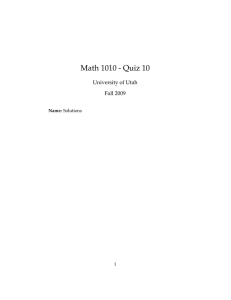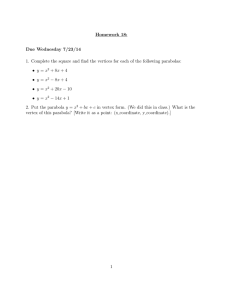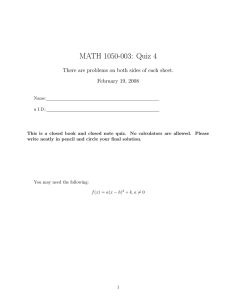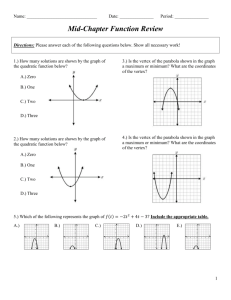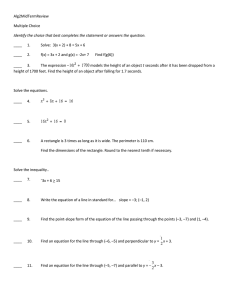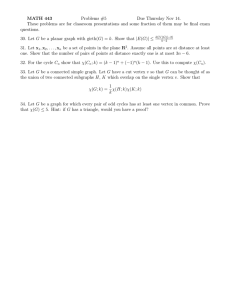DETERMINING THE MAXIMUM/MINIMUM VALUES PART A ~ INTRODUCTION (of a Quadratic Function)
advertisement
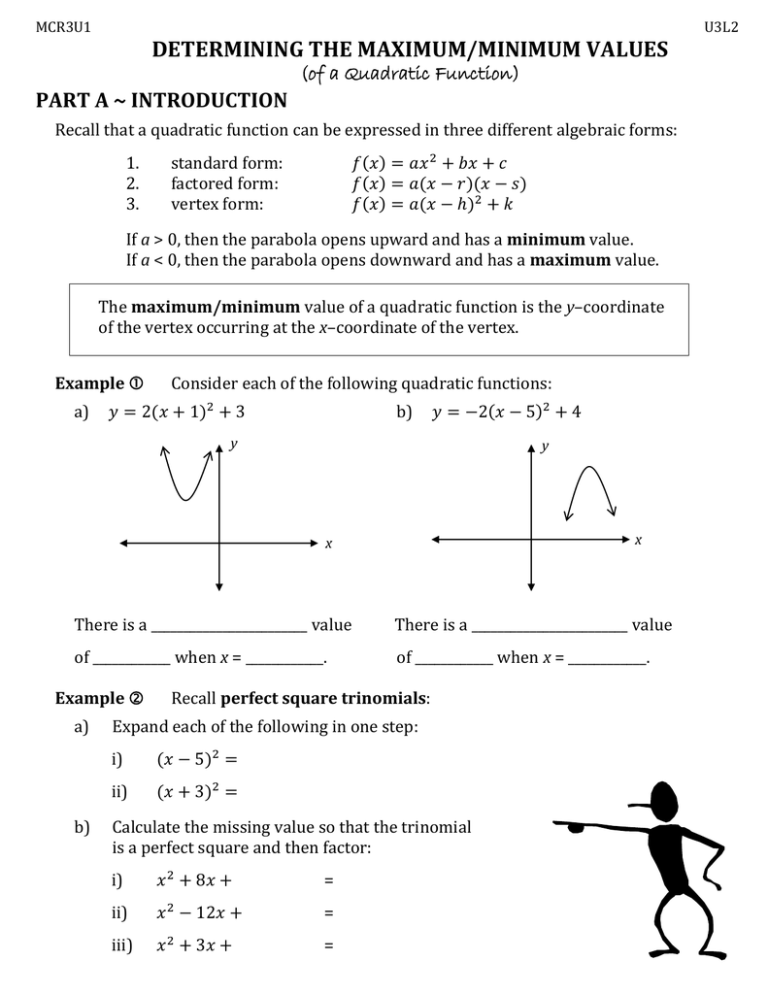
MCR3U1 U3L2 DETERMINING THE MAXIMUM/MINIMUM VALUES (of a Quadratic Function) PART A ~ INTRODUCTION Recall that a quadratic function can be expressed in three different algebraic forms: 1. 2. 3. 𝑓(𝑥) = 𝑎𝑥 2 + 𝑏𝑥 + 𝑐 𝑓(𝑥) = 𝑎(𝑥 − 𝑟)(𝑥 − 𝑠) 𝑓(𝑥) = 𝑎(𝑥 − ℎ)2 + 𝑘 standard form: factored form: vertex form: If a > 0, then the parabola opens upward and has a minimum value. If a < 0, then the parabola opens downward and has a maximum value. The maximum/minimum value of a quadratic function is the y–coordinate of the vertex occurring at the x–coordinate of the vertex. Example a) Consider each of the following quadratic functions: 𝑦 = 2(𝑥 + 1)2 + 3 b) 𝑦 = −2(𝑥 − 5)2 + 4 y y x x There is a ________________________ value There is a ________________________ value of ____________ when x = ____________. of ____________ when x = ____________. Example a) b) Recall perfect square trinomials: Expand each of the following in one step: i) (𝑥 − 5)2 = ii) (𝑥 + 3)2 = Calculate the missing value so that the trinomial is a perfect square and then factor: i) 𝑥 2 + 8𝑥 + = ii) 𝑥 2 − 12𝑥 + = iii) 𝑥 2 + 3𝑥 + = MCR3U1 U3L2 PART B ~ DETERMINING THE MAX/MIN VALUE There are primarily two methods to discover the vertex of a quadratic function: COMPLETING THE SQUARE ~ express the function in vertex form 𝑦 = 𝑎(𝑥 − ℎ)2 + 𝑘 𝑦 = −5𝑥 2 + 40𝑥 + 100 factor the a value from the first 2 terms 𝑏 2 complete the square using ( ) 2 (add & subtract value inside bracket) factor the perfect square trinomial; distribute the a value simplify the vertex is ____________ & there is a ________________________ value of ________ when x = ________ FACTORING (USE ZEROS) ~ express the function in factored form 𝑦 = 𝑎(𝑥 − 𝑟)(𝑥 − 𝑠) 𝑦 = −5𝑥 2 + 40𝑥 + 100 factor the a value from all the terms factor the trinomial identify the x–intercepts/zeros average the zeros to determine the x–coordinate of the vertex determine the y–coordinate of the vertex by substitution the vertex is ____________ & there is a ________________________ value of ________ when x = ________ MCR3U1 U3L2 PART C ~ APPLICATIONS One common application is revenue problems. revenue = price x quantity Example profit = revenue – cost = (price x quantity) – cost The revenue function for a new video game is 𝑅(𝑥) = −6𝑥 2 + 40𝑥 and its cost function is 𝐶(𝑥) = 4𝑥 + 48, where x is the number of games sold in hundreds. a) b) Determine the profit function (in thousands of dollars). Determine the maximum profit and the number of games that must be sold in order achieve this profit. HOMEWORK: p.153–154 #1–3, 4abcd (use different methods), 7ac, 8, 11ab, 15
